- Home
- Jeff Mariotte
Blood Quantum
Blood Quantum Read online
Blood Quantum
Jeff Mariotte
Following a free-spending night at an exclusive Las Vegas nightclub, the chairman of the Grey Rock Paiute Tribe is found brutally murdered in his home, a cryptic message scrawled on a wall in his own blood. Soon, crime scene investigators Ray Langston and Nick Stokes have their hands full with a growing mystery – already surrounded by controversy, the victim appears to have met his end from a crime of revenge, but the chairman's inner circle isn't talking about who or why… quickly leading to an escalation of violent retribution…
At the same time, Catherine Willows and Greg Sanders investigate the mysterious shooting of a homeless man on the palatial estate of Helena Cameron – the widow of one of Sin City 's first casino tycoons. At first, it seems like an open-and-shut case of trespassing and self-defense… but the CSIs soon uncover layer upon layer of heartbreak and tragedy in connection to a family keeping secrets as old as Las Vegas itself…
Jeff Mariotte
Blood Quantum
A book in the CSI: Crime Scene Investigation series, 2010
Acknowledgments
My sincere gratitude goes out to all the hardworking people behind CSI, to Maryann, to Ed, to Dianne Larson, to Howard and Katie, to the Crime Lab Project, and to authors Jeff Edwards, Jan Burke, and Dr. D. P. Lyle, MD.
This one's for Anita, who knows all about science.
1
It all happened so fast.
That was what people always said about this sort of thing, as if their minds couldn't quite keep up with the rocket-propelled pace of events. That wasn't how Drake McCann felt about it, though. To him, it had happened at the speed of life, no faster and certainly no more slowly.
He had been kicking back in his suite on the Cameron estate, watching some late-night TV with Kathleen Slides, the family's live-in housekeeper. They were friendly, nothing more complicated than that. Both were single, but he knew he wasn't her type. If he had a type, he had never figured out what it was, despite years of trial and error. And although he had dated fellow employees a couple of times, it always seemed to go bad. Someone made a mistake, and the whole situation ended up in Mrs. Cameron's lap, and she gave one of those stern lectures she was so good at, talking to the help as if they were wayward toddlers, and then fired one of them. So far, he had been lucky and had not been the primary target of her wrath, but last time it had been dose, and McCann had decided not to take that chance again. The world was full of women who didn't work for his employer.
Kathleen was a petite blonde who wasn't hard on the eyes, they had some laughs together, and they both enjoyed watching celebrities plug their wares on the tube after Mrs. Cameron had dismissed them and the day's work was done. That was good enough for now. He didn't need romance, and he enjoyed her company, and she seemed comfortable in his. Safe all the way around.
McCann was in charge of security for the estate, so even though he had a man on duty, when the front gate opened up, red lights flashed on instrument panels in his living room and bedroom. No visitors were expected that night, so he flicked on a monitor and selected the camera trained down the driveway toward the gate.
He was reaching for his phone when the call came in.
"I see him," McCann said.
"Know him?" Lyle Armstrong asked.
"Never seen him before." The monitor showed a white male who looked homeless at best and maybe deranged on top of it. His clothes were filthy, pants with the knees blown out and the hems ragged from being walked on, a shirt that might once have been white underneath a corduroy blazer that looked as if it had been wrapped around a truck tire and driven on for a hundred miles of hard road. The guy could have been wearing the jacket at the time. His hair was long and wild, ditto his thick brown beard. McCann could make out some facial scars from there, over the small monitor. The man's eyes glinted with madness, and he had an uneven gait, not quite a limp but almost. His hands were empty, but they kept bunching into tight fists, then relaxing.
"I'm in the control room. Want me to -"
McCann cut off the question. "You stay on the cameras, Lyle. And call the police. I'll intercept him."
He turned away from the monitor and nearly ran into Kathleen, who had come up behind him and was staring at the screen. "Who do you think that is?" she asked.
"No idea."
"But he came through the gate, right?"
The gate had still been swinging shut when the image first appeared on McCann's monitor. "Yeah. He must have got the code from someone, or he just got lucky. Either way, he's not supposed to be here."
Because Kathleen had been over, McCann was still dressed in a polo shirt and khaki pants. He pulled on a windbreaker against the cool of the April night, slipped on some loafers, and took a.38 revolver from his gun cabinet. It was loaded – he didn't keep unloaded weapons in the cabinet – but just the same, he checked to make sure.
"Be careful," she said.
"This is what I do," he reminded her. "Anyway, that guy's not going to be a problem. His kind never is. Probably just off his meds."
"Should I go to my room?"
"You can stay here if you want. I'll be back in a few. Let me know if Letterman says anything funny."
With the.38 in his hand and his hand in the windbreaker pocket, he went out, locking the suite's front door behind him. He had a private entrance, off the back of the main house. A paved walkway led around the west side of the building, down along the tennis court, then wound through a rose garden and over to the driveway. McCann took it at a near jog, wanting to get in front of the guy before he got close to the house. Helena Cameron had enough problems these days. The last thing she needed was to worry about intruders.
When McCann emerged from the roses, the stranger was still a good way down the flood-lit drive. His limp made his progress slow and ungainly, almost as if he had to remind his left leg to keep up with the right at every step. He was looking down at the ground and muttering something McCann couldn't make out.
"That's far enough, pal," McCann said. "Let's just stop right there."
The guy snapped his head up and glared at McCann. He could have been anywhere from twenty-five to forty-five; hard living and desert sun had creased and leathered his skin. Eyes that had looked a little crazy on the monitor a few minutes ago burned with rage. As far as McCann could tell, that rage was directed at him.
The guy shouted something. McCann couldn't make out the words, so garbled they might have been in a foreign language, but the tone was of barely restrained fury.
"I said hold it right there," McCann ordered. He showed the gun.
The guy took it in at a glance and spat out more unintelligible words, but he didn't stop or slow. He was stoned, drunk, mentally ill, or all three at once. McCann wasn't quite sure he was speaking English or that he understood it when it was spoken to him. He suspected that what came across as anger probably wasn't really, that the man just couldn't control his emotions or project them the way sane people did. But he couldn't afford to count on that hunch. He had to play it as safe as he could and assume the intruder was every bit the threat he appeared to be.
"Freeze," McCann said. He pointed the gun at the guy's midsection. "You've gone far enough. The police are on the way."
The man kept coming. A wave of stench engulfed McCann, the sour reek of clothing gone too long without washing, of a body that hadn't bathed in some time. His feet spread for balance, McCann held up his left hand, palm out, the universal signal for stop right there.
But this guy didn't clue in. He took another awkward step forward, then another. The smell of him closed around McCann's throat like the fingers of a strong hand. "I won't warn you again."
The guy said something else, his words so slurred that McCann
couldn't make them out, and he shoved his right hand deep into the pocket of his shabby blazer. In the unrelenting wash of the flood-lights, the shape in that pocket looked threatening.
As promised, McCann didn't bother with another warning. His job was to protect Mrs. Cameron and her property. Since he didn't hear sirens yet, and Willy hadn't arrived to provide backup, he squeezed the trigger, and the.38 in his hand boomed.
The shot tore into the man's left side. He staggered back, pulling his right hand out of the pocket with something clutched in it. McCann fired once more, twitching the barrel just a little. The second shot hit the man dead center, and he crumpled and went down.
McCann let him lie there for a few moments, until he stopped moving. There was, in fact, something clutched in the man's fist, but it wasn't a weapon after all. It was a slip of paper.
McCann heard sirens now. He crouched beside the guy, used the barrel of his gun to nudge the hand enough to see what the paper was. It was maybe five inches square, torn from something else, maybe a menu. Most of it was covered in penciled writing, every bit as unreadable as the man's spoken words had been impossible to decipher. But on top of the pencil were other words, written with black ink in what looked like a woman's hand. A couple of words stood out, and some numbers, and McCann realized he was looking at directions to the estate and the combination code for the front gate.
Someone had sent him there.
He pocketed his weapon and backed away, taking deep breaths once he got past the nimbus of stink surrounding the dead man. The cops would be there in seconds, and he didn't want to be crouching there with a gun in his hand when they came. The shooting was justified, but guns made people nervous.
Especially cops. Especially when there was a dead man involved.
Lights angled up the drive, headlights and blue and red rooftop flashers. McCann raised his arms above his head and waited.
*
"Nice place," Greg Sanders observed.
"Vegas royalty," Catherine Willows said. She was driving a Las Vegas Police Department Yukon up a winding driveway in Seven Hills, south of the city. The property had been landscaped to within an inch of its life. "You can't touch this neighborhood for less than a couple million."
"And this estate really belonged to Bix Cameron?"
"The one and only." Bix Cameron had been a casino tycoon, one of the city's prime builders back in the 1950s. Catherine's father, Sam Braun, had known him, and she had met Bix once or twice. She remembered a tall, fit man with close-cropped silver hair and a friendly twinkle in his eye, who always clasped her father's hands with both of his, then went down on one knee to greet her father's daughter.
"What's it been, like ten years since he went missing?"
"Around that." Greg was fascinated by the city's criminal history, and Bix Cameron's disappearance – what everyone assumed to be his murder – fit into that, even though, in life, Bix had been believed to be on the straight and narrow. Still, in those days, one could hardly build a casino without cutting the mob in, and Bix had built several. The assumption, when he had disappeared a decade ago, was that he had wound up crosswise with one of those criminal elements. Greg could have talked about the old-time gangsters for days if Catherine had let him. But the Cameron home loomed before them, looking like a palatial Italian villa, with walls of a pale mustard color and an undulating terra-cotta tiled roof, and Catherine wanted to focus on the job at hand. She had seen pictures of similar homes clinging to the hills around Lake Como. Lights blazed throughout this one, casting a glow down on the long driveway and the hundreds of roses arrayed on broad steps flanking the house. She brought the vehicle to a halt in front of a strip of yellow crime-scene tape, beside a couple of patrol cars and an EMS van.
She turned off the engine and stepped out. The fragrance of the rose garden hit her first, the April days warm enough to bring out the blooms, and though the nights were still cool enough for her light leather jacket, they no longer dipped below freezing.
Two steps farther up the drive, the smell of spilled blood and an unbathed human's dying moments replaced it. She preferred the roses, but not enough to quit her job and take up landscaping.
Greg stopped beside her, a camera in his hands. On the ground inside the yellow tape was a man, his arms outspread, legs together and slightly folded.
A pool of blood darkened the pavement beneath him. "Guess we found our vic," she said.
"I guess we did. And so did the chalk fairy."
Catherine looked again and saw a thin white line inscribed around the body. "Great."
They had passed one uniformed officer at the gate, there to keep the press out and allow official vehicles in, and signed in on his crime-scene log. Another one approached them now. "You the CSIs?"
"I'm Supervisor Willows," Catherine answered. "This is CSI Sanders."
"Cool." The uni addressed Catherine. His name was Vernon, according to the tag on his chest. He was African-American, mid-twenties, a weight lifter judging from the way his arms and chest swelled against his clothing. "Detective Vega wanted me to send you up to the command post when you arrived." He tilted his head up the driveway. She saw people milling around near the house. "He's there with the witnesses and the perpetrator."
"We already have a suspect?" Catherine asked.
"Security man for the family. Claims it was a righteous kill."
"I don't think that's his decision to make, but it would make our lives easier." She glanced at Greg. "You want to start taking pictures while I meet the suspect?"
"You got it."
Catherine went around the taped-off scene and up the hill, carrying the steel box containing her crime-scene kit. The command post was nothing more than a blank stretch of pavement beside the house, established to give the various cops someplace to congregate that wouldn't compromise the crime scene. Staggered around were a couple of obvious civilians, recognizable by the shell-shocked look in their eyes, with uniformed cops either talking softly to them or just standing by, keeping them separated. As always seemed to happen these days, there were cops standing around talking quietly into cell phones. She wondered who they were all talking to. Girlfriends? Reporters? Bookies? It was anybody's guess.
Sam Vega, solid and dark, stood with a burly, red-faced man in a windbreaker and jeans and another man, short, balding, and bespectacled, who could only be a lawyer. He wore a thousand-dollar suit and Bruno Magli shoes with a professional shine on them, and he had an imperious air about him, as if despite his physical stature, he was used to looking down at other people from on high – metaphorically speaking, at least. But when he wanted to, Sam could glower like nobody's business, and the lawyer almost seemed to be wilting in his presence.
"Catherine," Sam said, breaking into a smile at her approach. "Glad you're here. This is Drake McCann, head of security for the Cameron estate. He used to be on the job, back in Detroit. Marvin Coatsworth here is Helena Cameron's attorney. Mr. Coatsworth, Mr. McCann, Supervisor Willows is the crime lab's night-shift supervisor. She'll be in charge of the crime-scene investigation."
"Supervisor," Coatsworth said, shaking her hand with such brisk efficiency that Catherine wondered if he billed by the millisecond. He hadn't paid for that suit by being generous with his time.
"Good to meet you," McCann said. He offered his hand and a smile. Catherine happily took both; genuine courtesy from a shooting suspect was a rarity. She had met plenty of murderers, and for the most part, they were human scum, not people she would want to shake hands with. This man wasn't like that. "Wish the circumstances were different."
"I'm sure. Can you tell me what happened? I know you've already told Sam."
McCann looked to Vega, but the detective encouraged him to tell the story again in his own words. Coatsworth nodded his approval, and McCann launched into his tale. By now, he had surely told it enough times to winnow it down to the bare bones. "Guy came in the front gate. Apparently, he had the combination code written down on a piece of paper.
But take a look at him – he's a real case, let me tell you. Homeless at best, maybe mentally ill. Probably. He came at me angry, shouting something I couldn't understand, and ignored all my commands to stop. Finally, he reached in his pocket. I thought I saw the outline of a weapon, and after warning him, I fired twice. Put him down, and that's that."
"We've already got the weapon," Sam added. "It's a registered thirty-eight revolver."
"You mind if I swab you for gunshot residue?" Catherine asked.
"I already told you I shot him."
"It's a formality." The truth was, she had seen too many cases in which one person tried to take the rap for someone else. A GSR test would show whether or not he had fired a gun. His prints on the weapon would connect him to that particular gun, and ballistic analysis of the barrel and the markings on the round would link the gun to the bullets inside the dead man. Even in a case that might have been a legitimately defensive killing, she wanted to make sure the dots were connected.
She spotted Coatsworth nodding again, out of the corner of her eye. For a lawyer, he hadn't said much. Maybe he billed by the word, too, and was trying to give Mrs. Cameron a deal. Then again, she was reputedly one of the richest women in Las Vegas, so maybe he just didn't have anything to say at the moment.
"Fine, whatever," McCann said.
Catherine took a couple of cotton swab sticks from her kit. "You shoot with your right?"
"Yeah." McCann held that hand out.
"Were you wearing gloves?"
"No gloves."
She ran the swab across the back of his index finger, his thumb, and the web connecting the two, then capped that swab and did the same on his left hand. Lead, antimony, and barium were generally deposited on the hand, and sometimes on clothes, by the blowback that occurred when a weapon was fired. Revolvers tended to leak more of those materials than other weapons, and less than an hour had passed since the shooting, so the test should be fairly conclusive. All three substances also occurred in nature and could come from other sources, so the test wasn't absolutely positive, but it was a strong indicator.

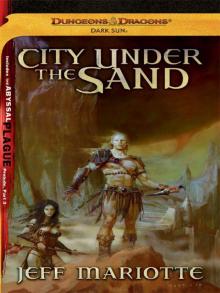 City Under the Sand
City Under the Sand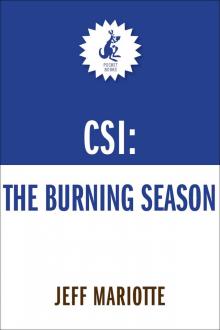 The Burning Season
The Burning Season Sanctuary
Sanctuary Winds of the Wild Sea
Winds of the Wild Sea Serpents in the Garden
Serpents in the Garden Close to the Ground
Close to the Ground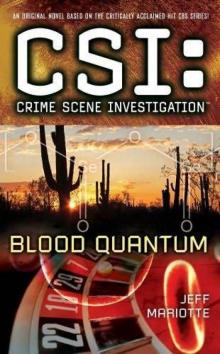 Blood Quantum
Blood Quantum Brass in Pocket
Brass in Pocket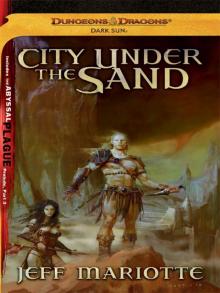 City Under the Sand: A Dark Sun Novel (Dungeons & Dragons: Dark Sun)
City Under the Sand: A Dark Sun Novel (Dungeons & Dragons: Dark Sun)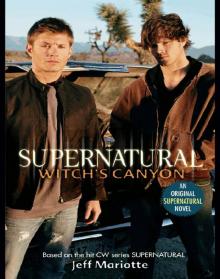 Witch's Canyon
Witch's Canyon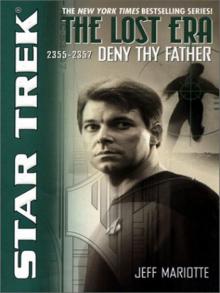 STAR TREK: The Lost Era - 2355-2357 - Deny Thy Father
STAR TREK: The Lost Era - 2355-2357 - Deny Thy Father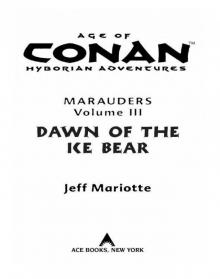 Dawn of the Ice Bear
Dawn of the Ice Bear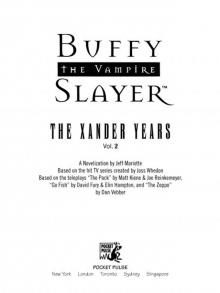 The Xander Years, Vol.2
The Xander Years, Vol.2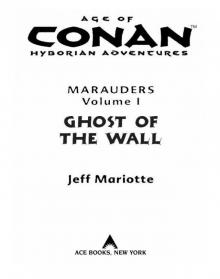 Ghost of the Wall
Ghost of the Wall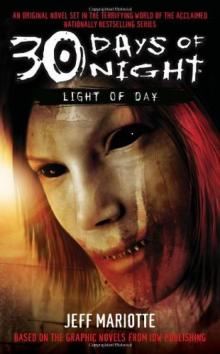 30 Days of Night: Light of Day
30 Days of Night: Light of Day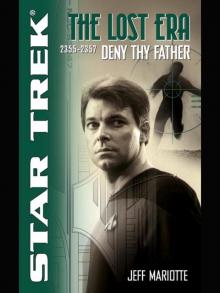 Deny Thy Father
Deny Thy Father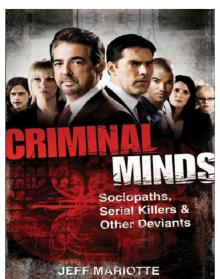 Criminal Minds
Criminal Minds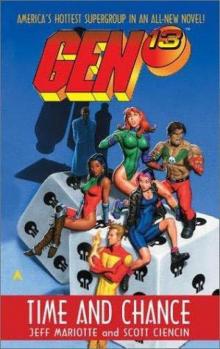 Time and Chance
Time and Chance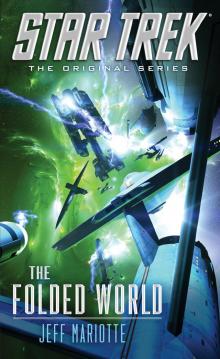 The Folded World
The Folded World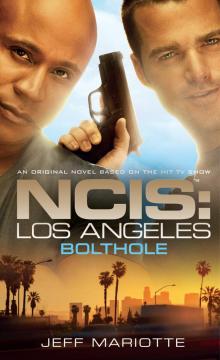 Bolthole
Bolthole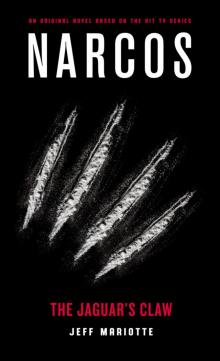 Narcos
Narcos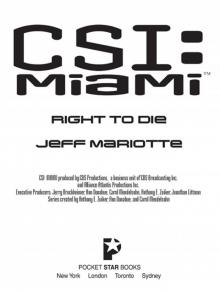 Right to Die
Right to Die